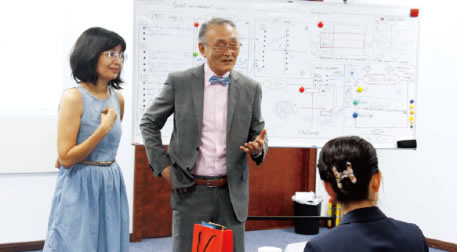Stories from the Field 01
Developing Human Resources as
a Foundation for the Market Economy
– First Japanese-style business school in Uzbekistan

Mr. Shinobu Fujita (center) serves as a lecturer in training at the Professional Management Program. (Photo: UJC)
Since gaining independence following the collapse of the Soviet Union in 1991, Uzbekistan has been implementing economic reforms with the aim of transitioning from a planned economy to a market economy. From the late 1990s government-led resource development projects were advanced and from 2004 onwards the GDP growth rate has maintained a consistently high level of between 7% and 9%. At the same time, however, diversification of industry is required in order for Uzbekistan to free itself from its economic structure dependent solely on natural resources.
Together with the Ministry of Foreign Economic Relations, Investments and Trade of Uzbekistan the Japanese government established the Uzbekistan-Japan Center for Human Development (UJC) to support the development of human resources in business which will form the foundation of the market economy. Since the establishment of UJC in 2001, approximately 14,000 people have participated in UJC’s business training courses and seminars. The core course at UJC is the six-month Professional Management Program (PMP), which has been highly evaluated as a business school-type program that enables students to learn practical marketing and management methods.
Since 2006 Mr. Shinobu Fujita of Strategic Consulting Firm Co. Ltd. has been working as a PMP instructor specializing in marketing.
When he first visited Uzbekistan, Mr. Fujita notes “My impression was that people’s lives were changing rapidly although they had gone from life without telephone to life with mobile phones in their daily lives, management practices were not catching up with the speed of technological innovation.”
The conventional market in Uzbekistan has been predominantly product oriented with no marketing aspect in its management. However, in recent years there has been a transition to a more market-oriented stance, where businesses are providing products based on consumer market needs. This transition also required a transformation in management methods. This is why the PMP at UJC does not only provide lectures on the theory of management, but concentrates efforts on giving students practical and concrete opportunities to learn about how to promote market-oriented manufacturing.
Already more than 1,500 business people in Uzbekistan have taken the PMP. After completion of this program, many of them have gone on to enjoy success in the business world.
One of these people is Mr. Bakhtiyor Negmatov, who established a potato chips manufacture and sales company in the capital Tashkent. Mr. Bakhtiyor also has experience of studying in Japan and decided to give his chips the brand name “SAMURAI.” They come in a variety of flavors, including shrimp and beef. He says, however, that after setting up the business he could not achieve the target he had hoped for. That was why he decided to learn about marketing on the PMP. When he sought advice from Mr. Fujita, telling him that he had no budget for product marketing, Mr. Fujita’s response was “think of the sales place as an advertisement.” His advice was therefore to think about factors such as display methods and selection of sales outlets. Two years on and sales of SAMURAI potato chips have grown significantly. They have now taken the top spot from a major brand competitor that previously had an overwhelming share of the market in Tashkent and sales continue to increase.
Mr. Bakhtiyor is not the only person either. There are countless examples of PMP graduates who have found success in various fields, including the manufacture and sale of furniture, food product manufacturing equipment, apparel, and stationery. Mr. Fujita believes that factors behind the PMP’s track record of producing success stories include the fact that the PMP is the first practical business school-type program of its kind in Uzbekistan and there is a strict entrance examination for the PMP, and also that graduates have continued access to consultation services.
When Mr. Fujita first started working as a lecturer, many people took the PMP course because they wanted to get a certificate and find employment. However, as the PMP started to prove itself in terms of outcomes and results, the number of young and middle-ranking managers as students, have increased. The objective of the people taking the program also changed, focusing more on achieving success in business. Today the PMP has gained its place as a solution center for SMEs in Uzbekistan.
Mr. Fujita says, “All of the successful companies have put into practice the modern marketing techniques they have learned from the PMP, including competition strategy, customer needs development, value creation, product differentiation, and targeting.” Many of the PMP graduates are also seeking to do business with Japan, including attending trade fairs and exhibitions held in Japan.
Mr. Fujita explains, “The people of Uzbekistan are very positively inclined towards Japan, but the people of Japan do not know about Uzbekistan well. First, starting the interaction between Japan and Uzbekistan, and the creation of a mechanism to enable business matching with Japanese companies are needed. I would be delighted if such mechanisms could contribute to expanded bilateral trade in the future.”
In order to accomplish “high-quality growth”, it is tremendously important to develop human resources in industry who will provide the foundation for growth. Through the efforts of UJC it is hoped that Uzbekistan will develop a firmer foundation for its high-quality growth.
Next Page >>
Main Text | Statistics and Reference Materials | Stories from the Field | Master Techniques from Japan to the World | ODA Topics
